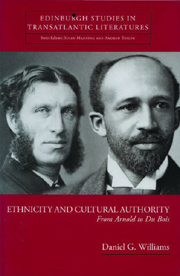2 - REALISM, ETHNICITY AND THE NATION
Published online by Cambridge University Press: 12 September 2012
Summary
After I had gone to Hartford in response to Clemens's telegram, Matthew Arnold arrived in Boston, and one of my family called on his, to explain why I was not at home to receive his introduction: I had gone to see Mark Twain. ‘Oh, but he doesn't like that sort of thing, does he?’ ‘He likes Mr. Clemens very much,’ my representative answered, ‘and he thinks him one of the greatest men he ever knew.’ I was still Clemens's guest at Hartford when Arnold came there to lecture, and one night we went to meet him at a reception. While his hand laxly held mine in greeting, I saw his eyes fixed intensely on the other side of the room. ‘Who – who in the world is that?’ I looked and said, ‘Oh, that is Mark Twain.’ I do not remember just how their instant encounter was contrived by Arnold's wish, but I have the impression that they were not parted for long during the evening, and the next night Arnold, as if still under the glamour of that potent presence, was at Clemens's house. I cannot say how they got on, or what they made of each other; if Clemens ever spoke of Arnold, I do not recall what he said, but Arnold had shown a sense of him from which the incredulous sniff of the polite world, now so universally exploded, had already perished.
W. D. Howells, ‘My Mark Twain’ (1910)- Type
- Chapter
- Information
- Ethnicity and Cultural AuthorityFrom Arnold to Du Bois, pp. 72 - 120Publisher: Edinburgh University PressPrint publication year: 2005



